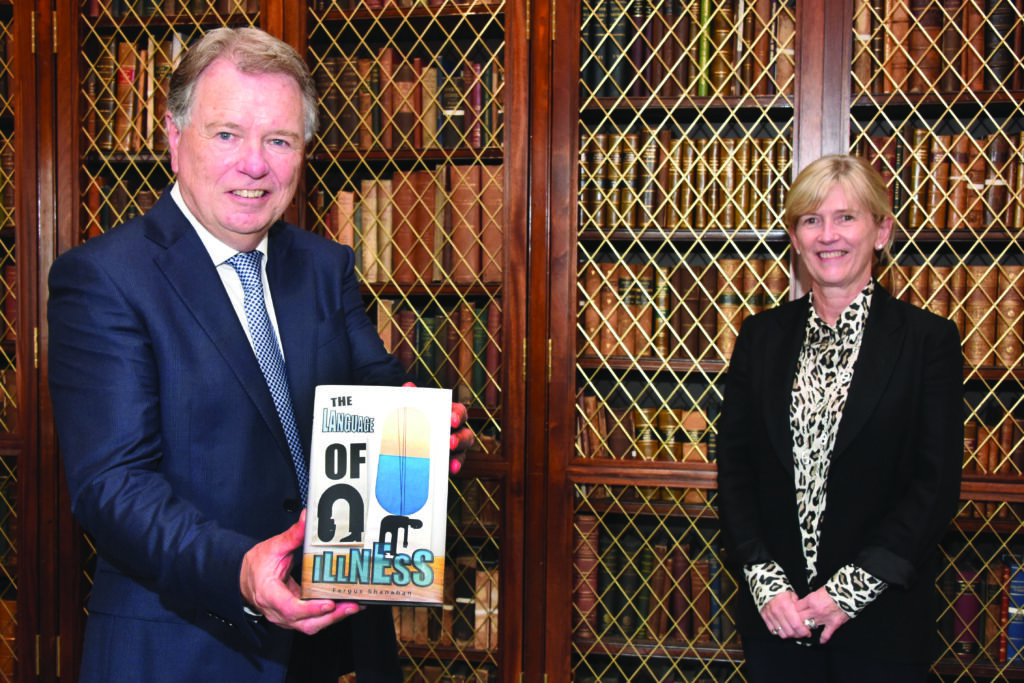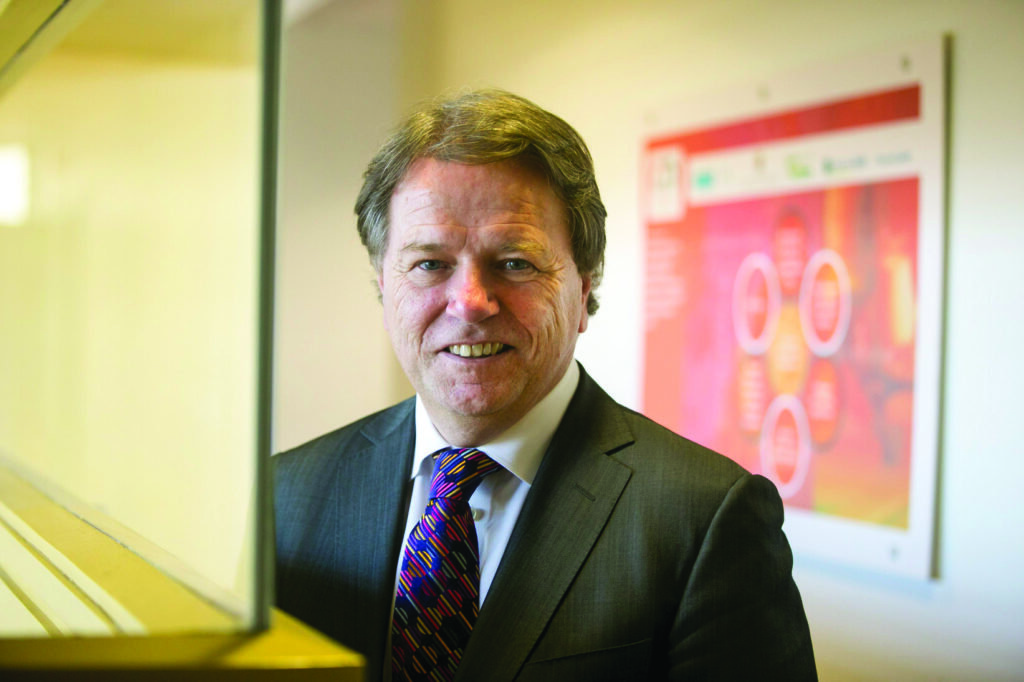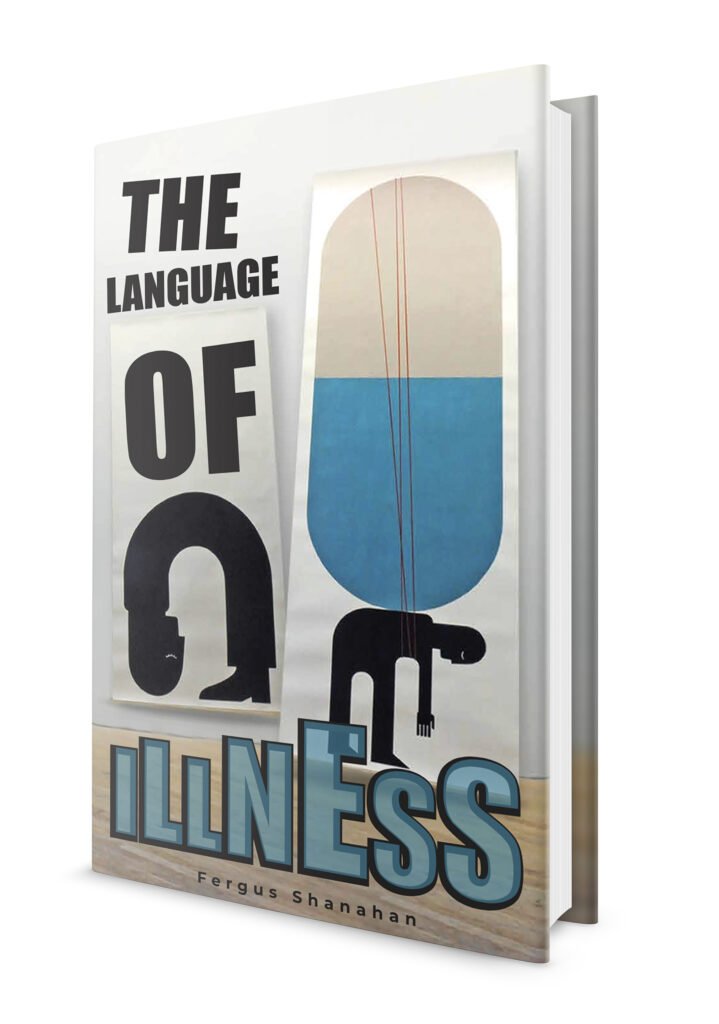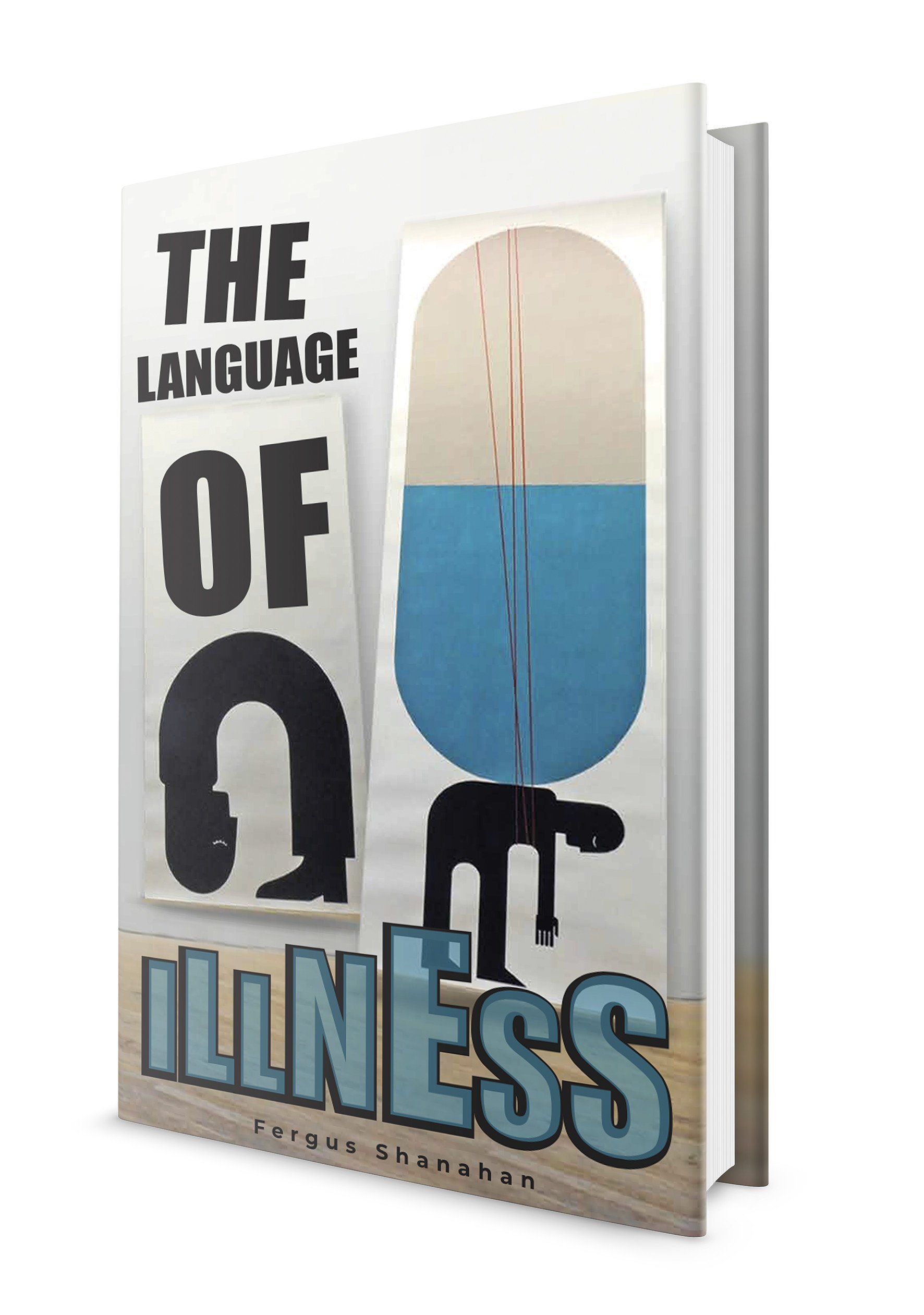Paul Mulholland speaks to Prof Fergus Shanahan about his new book, The Language of Illness, and how the communication between doctors and patients can be improved through straightforward speech and dispensing with inappropriate medical terminology
According to Prof Fergus Shanahan, in addition to its dire healthcare and economic effects, a pandemic can also create a crisis of communication. Regarding Covid-19, the Emeritus Professor of Medicine at University College Cork (UCC) is critical, in particular, about the public health messaging by the US and the UK governments.
“Covid-19 has shown how much we value clear, consistent messages,” Prof Shanahan told the Medical Independent (MI).

“And how much we comment upon and pick apart our leaders’ messaging. We have seen lots of mistakes. And we have obviously seen the bad language and bad communication in North America [on Covid-19]. You just have to look at some of Donald Trump’s language.
As one journalist said, ‘The President just told us that he didn’t tell us what he just told us.’ So Donald Trump reverses himself even in the same sentence. And there have been numerous bad examples. Not so much in Ireland, I have to say, but mainly in the UK and North America.”
Some of these examples are listed in his new book, The Language of Illness (Liberties Press, 2020). Prof Shanahan refers to how a UK government spokesperson used “defensive bureaucratic language” when asked why frontline medical staff were left inadequately protected from the virus in the early months of the pandemic.
Medical language – disease-speak – is highly imprecise. It’s full of obfuscation and inaccuracies, misnomers, ambiguities, and paradoxes
Instead of admitting there was a shortage of masks, equipment, and tests, the spokesperson said there was a “need for more” of these provisions. And instead of apologising to frontline workers, the spokesperson said: “I’m sorry if people feel they can’t get these items.”
“If I had only one thing to say to politicians and public health officials it would be for them to use plain speech,” Prof Shanahan said.
“People will support you and forgive almost anything if you use honest plain speech. Don’t tell us that the shortage of PPE [personal protective equipment] early in the outbreak of the pandemic was only a perception or that we received something from China that looked different than what we are used to.
Just tell people, ‘look we made a mess of that, we will try to get it right.’ When people are taking 72 hours to get a result, just say ‘we are trying to do better’. People are remarkably forgiving if they hear the truth. There is nothing like the truth. And you don’t need to go to a public relations expert, or a media expert to tell the truth.”
Illness versus disease
Prof Shanahan is an Honorary Consultant Gastroenterologist at Cork University Hospital, having recently retired from clinical practice. A clinician-scientist with over 40 years’ experience helping patients with chronic inflammatory bowel disease, he has received international awards for his contributions to medical science and the medical humanities.
He was the first recipient of the Hektoen International Grand Prix and was Foundation Director of the SFI-funded research centre APC Microbiome Ireland. He has published more than 550 scientific papers and numerous books, including Fast Facts in Inflammatory Bowel Disease, which won the British Medical Association Book Award for gastroenterology in 2006.
Prof Shanahan told MI that his new book stems chiefly from a desire to bridge the communications gap between doctors and patients.
“It struck me I had written about and analysed chronic disease from all sorts of different angles: The immune system angle; the angle of the brain; the angle of the microbiome,” he said.
“People will know I have numerous textbooks out on inflammatory bowel disease, Crohn’s disease, written from all kinds of different angles. But I had never written on the illness. I distinguish between the disease and the illness. The disease being the objective evidence that there is something wrong and the illness being what the patient experiences.”
Prof Shanahan said that illness “is far more complex” than the disease. As part of his research, he read ‘illness memoirs’ to see what they had to say about the patient experience.
“I found that a lot of them were useful in terms of being informative with facts, but not really compelling. A lot of them were not all that well written. This wasn’t through anybody’s fault. It’s just that the best illness memoirs were written by the best writers, but they wouldn’t necessarily be the people who had suffered the most.
So what I did was, I decided to mine the words, to look at the words that were consistent and recurred throughout these memoirs. I wanted to address the words that don’t appear in any of my textbooks or any of my previous articles. Words like ‘numbness’, ‘disbelief’, ‘dismissal’, ‘shame’, ‘anger’, ‘fear’, ‘loss’.
Now I’m not saying doctors have ignored these, but they don’t see them much in any of the educational textbooks and I wanted to contribute to that learning.”
Another impulse lay behind the book. Prof Shanahan said he wanted to, in his words, “attack medical language.” Given we are living in an age which aspires towards ‘personalised’ or ‘precision’ medicine, he wanted to argue why the language of medicine needs to be more precise.
“Medical language – disease-speak – is highly imprecise,” he said.
“It’s full of obfuscation and inaccuracies, misnomers, ambiguities and paradoxes.”
Imprecisions
In his book, Prof Shanahan lists many of medicine’s linguistical imprecisions. He writes, for instance, that biliary colic is not a colic, which is defined as a spasmodic pain that waxes and wanes. He notes that vitamin D is more a hormone than a vitamin. Autoimmune diseases are usually immune-mediated, but rarely ‘autoimmune’. The list goes on.
He also refers to recurrent imprecisions on medical charts, such as ‘the vital signs are stable’.
“You can’t say they are stable if you have only measured them once. But frequently, house officers and consultants and nurses say, ‘Ah yes, the vital signs are stable.’ What they actually mean is that, ‘I have measured them once and they are within the normal range.’ But you shouldn’t be saying they are stable. That is imprecise. But it is of practical value.
“They’ll also say things like, ‘The nervous system was grossly intact.’ You will see that in charts in every hospital. But you can’t say the nervous system is grossly intact. That just means you didn’t examine it.”
They will also say, ‘nothing abnormal detected.’ By that they mean, there was nothing obvious. They are just practical imprecisions you’ll see on charts all the time.”
These points are not merely academic, he told this newspaper.
“We shape our thinking and our concepts and our judgements with language, and if your language is sloppy, as George Orwell said, it leads to sloppy thinking and sloppy decisions. It mightn’t matter too much to the patient, but it does matter if you are investigating and are scientifically involved. You really have to use precise language if you want to get precise answers.”
There are instances, however, when the improper use of language can have an effect on patients. Stigma often arises in the use of arcane or inappropriate terminology.
“An extreme example is around substance abuse. You often hear people referred to as an addict. Now this is a person in the first instance, this is a person with a problem with addiction. They’re not defined by their addiction; they shouldn’t be called an addict. That’s a derogatory pejorative term.
Some people might think ‘Well they deserve that term; they are hooked on some drug’. But if we ever want to help those people, they are not going to come to clinics if they start off hearing a stigmatising label like that. We’d never use the term ‘leper’ nowadays.
You say ‘that’s a person with leprosy’. But in the substance abuse arena we use terms like ‘he’s clean today’, if he tested negative. ‘He’s clean today’ implies he’s dirty. And there are numerous examples like that. If you use that kind of stigmatising language you won’t get the buy-in, they won’t want to come back [for treatment].”
Prof Shanahan said there is a similar problem with regard to obesity.
“Nobody wants to be referred to as ‘obese’. Obesity is one situation where the public health language has basically left us with a lot of guilt-laden people. It fails to take various factors into account. It is true if you overeat or under-exercise you’re going to gain weight, but that’s only a half-truth. It hides the fact that poverty comes into play here.
What about if you’re a single mother with four kids and your husband has left, or your husband has died, and you’re surrounded by McDonald’s and high energy dense foods? There are numerous situations where it’s not the person’s fault.
How often do you see a family walking in the street where two parents are overweight and the youngster is overweight as well? I don’t believe they should be guilt-laden and criticised and blamed. There are other reasons; we know there are epigenetic reasons for this. It isn’t just a matter of people overeating and under-exercising, there’s a lot more to it.
If we want to do anything about obesity then I think stigmatising those who have the problem is not a good starting point.”
Also, Prof Shanahan writes that the names of some medical conditions, or eponyms, have ignominious historical origins. Wegener’s granulomatosis or Reiter’s syndrome were named after Nazi sympathisers.

Similarly, Asperger’s syndrome is so-called to honour the work of the Austrian child psychiatrist Hans Asperger, for his concept of ‘autistic psychopathy’. When the condition was named, Asperger’s collusion with the Nazi regime was not widely known.
“These individuals have quite disreputable pasts in Nazi Germany. They are an extreme example, but I wouldn’t like to have a disease that was named after a Nazi sympathiser.”
Obfuscation
Prof Shanahan pointed out that doctors are often direct and straightforward with patients when the cause of a disease is known (ie, ‘The cause of your cough is smoking’).
“But if I don’t know the cause, what sort of words do we use then? We say ‘the aetiology is unknown’. Or we might say – the medical students learn this on the first day in med school – ‘idiopathic’. Or they used to say, ‘essential hypertension’, which means ‘we don’t know what it is’.”
The mystique [of medicine] is distancing and there is no need for it. It is historic and it is outdated. That is my argument in the book; it is long overdue that medical language needs reform
Returning to the current pandemic, Prof Shanahan sees the same problem with the phrase “community-acquired” Covid-19.
“What does that mean? It actually means that ‘we don’t know where you got it from’. So why are we using community-acquired, which is imprecise. The truth is we don’t know. Why don’t we say we don’t know, that the source is unknown.
Wouldn’t that beg the question, ‘why don’t we know?’ Well, maybe our test and tracing isn’t good enough. Maybe we were too slow. Maybe I only got to you 10 days after you had the contact that gave you the Covid. Why did I only get to you 10 days afterwards?
Why is the result of the testing coming back so late?’ But if you start using these euphemisms such as ‘ community-acquired’, well you are starting down the wrong road straight off by not using precise terms.”
Public health
Poor language usage can have a negative effect on other public health messages, according to Prof Shanahan. He gave the example of antibiotic resistance, describing it as “arguably the real global pandemic of our time”. Prof Shanahan pointed out that many countries have identified antibiotic resistance, along with global warming, as an issue of the highest priority.
“If we didn’t have antibiotics think about how things would change,” he said.
“Just think about Caesarean sections, think about being in hospital, think about things we take for granted that you can take an antibiotic for. And we are running out of antibiotics.”
He noted how few people understand that antibiotic resistance is actually an infectious disease. If the nature of carbapenemase-producing Enterobacteriaceae (CPE) was more widely understood, Prof Shanahan said the issue would be treated with greater seriousness by the public.
“They are resistant bugs. But the resistance is spread by genes jumping from one bug to the next. That is why I say it is highly infectious and we should be calling it by its right name. It is an infectious antibiotic resistance; we should be using the right terms so we are very clear on the matter.
“Surveys have been done in the UK and in the US, which consistently show that 50 per cent of the public don’t actually know what you mean when you say antibiotic resistance. They actually think the patient, not the bug, is resistant to the drug. So somebody is not getting the message out.”
Medical schools
What can be done to address the problems of imprecision and obfuscation? How can medical language become more straightforward to improve communication between doctors and patients?
Prof Shanahan believes part of the solution lies in how medical students are taught.
“Medical schools have to stop teaching people this way. I have tried myself for years to stop medical students using silly terms. You would probably be surprised to hear that the average number of new words a medical student learns in their first one-to-two years is 10,000. What we do is we replace the familiar with the unfamiliar.
For example, an itch becomes ‘pruritus’. A nose bleed becomes ‘epistaxis’. Bleeding becomes ‘haemorrhage’. And a runny nose becomes rhinorrhoea. What is wrong with a runny nose?

“Now the average first class honours student for German or French, at the end of their course, might acquire a vocabulary of between five-to-6,000 new words. So a medical school student learns all of these high terms, and then has to forget them when they are talking to patients, because they are not necessary.”
Prof Shanahan does not deny that medicine requires some technical terminology. However, he says the number of technical terms is “far fewer than what people might think”.
Historical
In Prof Shanahan’s view, the problem with medical language arose because of historical circumstances.
“Doctors started only being able to do something, I’d argue, within the last 60 years, though some would say the last 100 years. Yet doctors in the past gave a lot of time and a lot of caring to patients, even if they could not do much for a lot of the diseases and a lot of the illness.
With surgery, with antibiotics, with all the drugs we have, with all the marvellous advances, we can do a lot more now. But in the past we had all these fancy words that created this great aura. There is no need for medicine to be mysterious. And patients will frequently say there’s this mystique to the whole thing.
The mystique is distancing and there is no need for it. It is historic and it is outdated. That is my argument in the book; it is long overdue that medical language needs reform.”
Prof Shanahan argued that medical advances rarely translate into a doctor being able to spend more time with a patient. In fact, the opposite tends to be the case.
“As we have gone towards high tech [medicine], patients need more time with their doctor, and the doctor needs more time with their patient. But that precious and diminishing amount of time is actually obfuscated by all these silly terms that actually worsen the situation and create greater distance between a doctor and a patient. I want to show how inaccuracies lead to sloppy thinking and bad public health messages.
But it really does lead to a deterioration in the quality of a doctor and patient relationship, if one is speaking a different language. It creates this asymmetry between the doctor and the patient.
The patient arrives in crisis, but for the doctor, it’s routine. The patient should be the boss, but it rarely feels like that. I think that language should not be one of the contributors to this asymmetry.”
See p41 for a review of The Language of Illness













Leave a Reply
You must be logged in to post a comment.